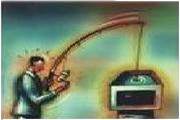
The UK payments trade association reported that Web bank losses rose by 55 percent from $36.25 million in the first six months of 2005 to $56.25 million in the same period this year.
Apacs warned that "millions of Britons are still not aware of some basic security pitfalls".
More than half of online shoppers never check that a website address changes from http to https before making a purchase, indicating that awareness of secure shopping advice is low.
Losses from online, phone and mail order fraud were found to have grown slowly compared to the growth in the number of online transactions.
More than 26.4 million people now shop online with an estimated 372 million transactions being undertaken last year.
The majority of internet card fraud, however, involves a criminal obtaining genuine card details in the real world which are then used to shop online.
A quarter of all Britons have disclosed their Pin to someone else, exposing them to a heightened risk of fraud and potentially making them liable for any card fraud losses they may suffer.
More than a quarter of people admitted using the same Pin for all their cards, which makes life easier for the fraudster given that each cardholder in the UK has an average of four cards.
Increases in counterfeit card fraud losses were mainly driven by fraudsters copying magnetic strip details and using hidden miniature cameras to capture Pins at cash machines.
Criminals then create fake magnetic strips for use at cash machines and tills that have not been upgraded to chip and Pin.
However, Internet, phone and mail order fraud (i.e. card-not-present fraud) increased at a much slower rate than seen previously.
Card-not-present fraud now accounts for 46 percent of all losses but grew by just five percent year-on-year, compared to a 29 percent increase between 2004 and 2005.
Sandra Quinn, director of corporate communications at Apacs, said: "These latest fraud figures show that the industry's efforts are making their mark.
"However, each and everyone of us can also help defeat the fraudsters, and protect our cards and online accounts, by keeping our Pins, passwords and personal information safe and secure."
Home Office minister Vernon Coaker added: "Fraud is not something that can be tackled in isolation, and the best results can only be obtained by working together.
"The government takes fraud very seriously whether the victim is a multimillion pound organisation or a single individual."
Apacs 10 Top Tips to Foil the Fraudsters:
- Do not let cards or card details out of your sight when making a transaction
- Destroy, preferably shred, any documents or receipts that contain personal financial information when you dispose of them
- Do not keep passwords, log-in details and PINs written down
- Do not disclose PINs, login details or passwords in response to unsolicited emails claiming to be from your bank or the police
- When entering your PIN in a shop or a cash machine use your spare hand to shield the number from prying eyes or hidden cameras
- Only divulge your card details in a telephone transaction when you have instigated the call and are familiar with the company
- Make sure your computer has up-to-date antivirus software and a firewall installed
- If you have registered your card for online protection via Verified by Visa and MasterCard SecureCode ensure that your password is kept safe and secure
- Access Internet banking or shopping sites by typing the address into your Web browser. Never go to a website from a link in an email and then enter personal details
- Shop at secure websites by ensuring that the security icon (locked padlock or unbroken key symbol) is showing in the bottom of your browser window




_(22).jpg&h=140&w=231&c=1&s=0)




_(26).jpg&w=100&c=1&s=0)
 iTnews Executive Retreat - Security Leaders Edition
iTnews Executive Retreat - Security Leaders Edition












_(1).jpg&h=140&w=231&c=1&s=0)



